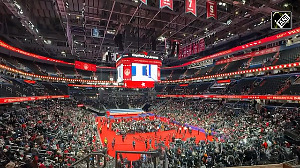The Allahabad high court Friday declared the Uttar Pradesh Board of Madarsa Education Act, 2004, "unconstitutional" and violative of the principle of secularism, and asked the state government to accommodate current students in the formal schooling system.

A division bench comprising Justice Vivek Chaudhary and Justice Subhash Vidyarthi of the Lucknow bench of the court declared the law ultra vires on a writ petition filed by a person named Anshuman Singh Rathore.
In his reaction to the order, UP Madrasa Education Board Chairman Iftikhar Ahmed Javed said the board will study the decision and decide the further course of action.
"Now after 20 years, the Madrasa Education Act has been declared unconstitutional. Obviously there has been some mistake somewhere. Our lawyers could not present their case properly before the court," he said.
Senior All India Muslim Personal Law Board (AIMPLB) member Maulana Khalid Rashid Farangi Mahali said the order should be challenged in the Supreme Court.
The petitioner had challenged the constitutionality of the UP Madarsa Board as well as objected to the management of madarsa by the Minority Welfare Department, rather than the education department.
The petitioner and his counsel submitted that the Madarsa Act violates the principles of secularism, which is the basic structure of the Constitution, fails to provide quality compulsory education up to the age of 14 years/Class-VIII as is mandatorily under Article 21-A; and fails to provide universal and quality school education to all the children studying in madarsas.
"Thus, it violates the Fundamental Rights of the students of the madarsas," they claimed.
Opposing the petitioners, the state government counsel said that no doubt the Madarsa Board is providing religious education as well as religious instructions to the students, but the State has sufficient power to impart such education under the Constitution of India and is rightly permitting such education.
"Providing religious education and instructions is not barred or illegal. For such religious education a separate Board is necessarily required, which needs to have members of such particular religion," he said.
There are about 25,000 madrassas in Uttar Pradesh of which 16,500 are recognised by the Uttar Pradesh Madrassa Education Board. Of them, 560 madrassas receive grants from the government. Apart from this, there are 8,500 unrecognized madrassas in the state.
Reacting on the decision of the high court, Madrasa Education Board Chairman Javed told PTI that his lawyer probably could not present their case properly before the court.
Javed said that the high court's order will have a major impact on government-aided madrassas. If the Madrasa Education Act is repealed, teachers of aided madrasas will become unemployed, he said.
"In 2004, the government itself enacted the Madarsa Education Act. Similarly, Sanskrit Education Council has also been formed in the state. The objective of both the boards was to promote languages like Arabic, Persian and Sanskrit," he said.
On the question whether this decision of the high court will be challenged in the Supreme Court, Javed said, "Now it is for the government to decide, because the court has given orders to it."
AIMPLB member Farangi Mahali said this order of Allahabad high court should be challenged in the Supreme Court.
He said the Muslim community has established madrassas as per its constitutional rights, "just like there are Sanskrit schools".
"Modern education is also being given in madrassas. If the Madrassa Education Act itself is abolished, then teachers of hundreds of madrassas in the state will become unemployed and there will be a question mark on the future of the children studying in them," he said.
This will create a very difficult situation, hence this order must be challenged in the Supreme Court, Farangi Mahali said.










 © 2025
© 2025